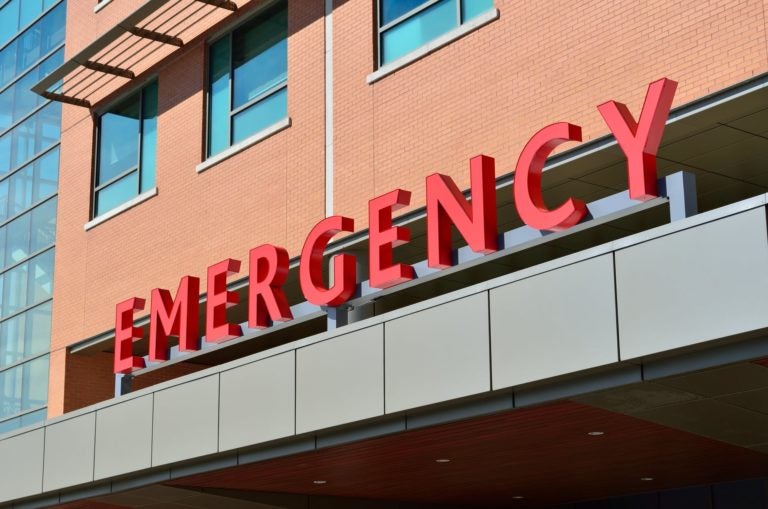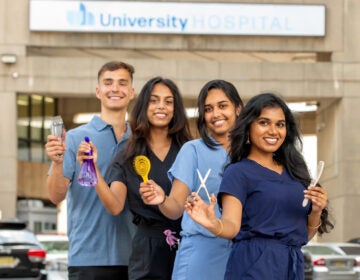N.J. state to expand hospital-based programs to help victims break cycle of violence
Specially trained workers meet with victims at bedside and help them make changes that reduce chances they will be reinjured

Officials hope promising anti-violence program can prevent repeat trips to the ER. (Pixabay via Pexels)
This article originally appeared on NJ Spotlight.
–
Hospital-based programs designed to help victims of gunshots, stabbings or similar incidents escape the cycle of violence have shown some early promise in cities across the nation, including Newark. Now New Jersey is poised to build on that success with a record-setting new investment in health-care related anti-violence initiatives.
The Garden State will use $20 million in federal Victims of Crime Act funding to launch seven new programs and expand two existing initiatives, including the state’s first at Newark’s University Hospital and a program recently started at Jersey City Medical Center. While dozens of cities have VOCA programs, New Jersey’s effort involves the nation’s largest single investment in this violence-intervention model, officials said.
Hospital-based intervention programs deploy specially trained workers to meet with victims of violence bedside and help them make changes that reduce the chances they will be reinjured and return to the emergency room. The process can involve connecting them with counseling or substance-use disorder help, but also assistance finding safe housing or steady work, obtaining a government identification card or removing gang-affiliated tattoos.
Gov. Phil Murphy announced the VOCA funding late last month during an event in Jersey City — the site of a December shooting that left six dead, including a police officer. Murphy was joined by state and federal officials including former Arizona Congresswoman Gabrielle Giffords, who became a leading advocate against gun violence after she was shot at a public event in 2011.
“With the implementation of hospital-based violence intervention programs, our state is better equipped to support victims and offer best practices to the community organizations working to prevent additional violence from occurring,” Murphy said.
The nine facilities applied for the funding, which is designed to support them for 21 months.
‘A necessary leap’
The initiatives are based on a package of legislation first championed by Assemblyman Louis Greenwald (D-Camden) that the governor signed last year. In 2018 Murphy also helped launch New Jersey’s Center on Gun Violence Research at Rutgers University, which pulls together diverse expertise to study firearms technology and recommend public-policy changes.
“The state has always met tragedy with action, and never stopped pushing forward in addressing the gun violence crisis,” Giffords said in Jersey City. “Providing communities the resources to fight this epidemic is a necessary leap in the right direction.”
New Jersey has among the lowest rates of gun deaths nationwide, but it is on the rise and 482 state residents die each year on average, according to Everytown for Gun Safety, a national advocacy organization.
Nearly six in 10 gun deaths are homicides; the remainder involve suicide. There is also a huge racial disparity in gun violence, especially in New Jersey, where black residents are 31 times more likely to die in a shooting than white residents, the group notes.
These numbers don’t include those wounded by firearms — University Hospital alone treats more than 400 gunshot victims annually, doctors said — let alone people injured by knives or other weapons.
Beyond physical wounds
The toll of violence goes beyond physical wounds, experts note, and can have a cascading negative effect on families and communities. A gunshot victim may be forced to take time off work or lose a job, which could lead a family into homelessness — upending their lives, their children’s education and more.
Intervention programs based in hospitals or health care networks seek to lessen these impacts by interrupting the vicious circle, with victims who become “frequent flyers” at emergency rooms and local clinics.
The programs generally focus on what is considered nonpersonal violence outside the home, as opposed to intimate partner violence. But they frequently work in tandem with domestic-violence initiatives, according to those involved.
In urban settings, at least 40% of patients treated after a violent incident are re-injured within five years, according to the Health Alliance for Violence Intervention, which supports programs in roughly 70 communities nationwide, including New Jersey’s initiatives. One in five die within five years, the group said.
Using the hospital as a starting point to address this cycle just makes sense.
“We know they’re a victim. They’ve come to the hospital. They’re not hard to find,” HAVI’s executive director, Fatimah Loren Muhammad, said. “There’s a golden opportunity to provide services at the bedside.”
How it works
The process starts with an “interventionist” who seeks to gain the patient’s trust and talk to them about their daily challenges and how these might contribute to violence. To be successful, the interventionist must share the cultural background and life experience of the patient, Muhammad explained.
“Having that local engagement and being in touch with the community is really essential to what we do,” said Michael Ordonez, a program support specialist for the University Hospital effort, which launched in 2017. The interventionists offer help without judgment, he said, something that can be transformational for those involved. “When we see patients at the bedside, they go through a kind of epiphany,” Ordonez added.
Hospitalized victims are often in a raw emotional state and open to lifestyle changes, experts note.
“Many of the people who have been violently injured have experienced trauma at a number of levels,” Muhammad explained. “They may say they’re fine. It’s really peeling back the layers.”
The interventionist helps the patient set goals and develop a plan for change, then assists them in navigating the public and nonprofit systems to put it into action, she added. This requires the programs to develop effective partnerships with other health care providers, the justice system and social service agencies.
“All of those very human needs and challenges arise (during the intervention process). They’re focusing on things like the social determinants of health, like housing and employment, and in the case of retaliatory violence, they’re there to help people see things differently,” Muhammad said.
In the Newark program, most of the clients are at risk for being homeless, Ordonez said, and many need help obtaining a current ID.
While victims’ needs vary greatly, Muhammad said the need for culturally appropriate mental health care often tops the list.
“It’s a huge need and it’s not as simple as introducing them to a social worker and setting up some sessions, she said. “We’re not just talking about access, but actual absorption of services.”
HAVI is still working to assess how these programs have changed the level of violence in participants’ lives, but Muhammad said they have improved access to education, employment, stable housing and other services that have positive benefits.
“You can’t change the ecology of a place overnight,” she added.
An impressive track record in Newark
At University Hospital, early indicators suggest the initiative is working as intended, according to Dr. Stephanie Bonne, the program’s medical director and original champion. Bonne, a professor at Rutgers New Jersey Medical School and collaborator in gun-violence research program, said while 6% of patients typically return to the hospital within 3½ years, only 1% of those involved in the violence-intervention program have been back so far.
In addition, Bonne said the average cost of a second hospitalization for gunshot wounds is $85,000, so avoiding those repeat visits saves the health system money. “When you start looking at it in that way, it starts to add up very quickly,” she said.
The University Hospital program has involved about 250 city residents to date, Bonne said, under a grant from the HealthCare Foundation of New Jersey, a nonprofit based in Newark. The VOCA funding will let them grow the effort in both scope and size to reach those who live outside Newark’s borders.
“With this expansion and the money coming down from the state,” Bonne said, “we will be able to serve all residents of all municipalities and all manners of violence.”
Bonne is “cautiously optimistic” about the launch of new programs at other sites. The potential is huge, she said, but success requires dedicated leaders and buy-in from staff across the hospital.
“Making a big investment in these programs is certainly a good move on the part of the state and it represents something that has not been done anywhere else,” she said. “But you don’t just need a big pot of money. You need people who are willing to fight the fight.”
And, she added: “My caution is: What happens when the money dries up?”
Here’s the list of programs funded through VOCA:
- RWJBarnabas Jersey City Medical Center, serving Hudson County
- University Hospital in Newark, serving Essex County
- Center for Family Services in Camden, serving Camden County
- Trinitas Health Foundation in Elizabeth, serving Union County
- AtlantiCare in Atlantic City, serving Atlantic County
- Capital Health in Trenton, serving Mercer County
- RWJ University Hospital in New Brunswick, serving Middlesex, Somerset and Union counties
- Hackensack Meridian Health’s Jersey Shore University Medical Center, in Monmouth County, which will focus on Asbury Park, Neptune Township and Long Branch City
- St. Joseph’s Health in Paterson, serving Passaic County.
WHYY is your source for fact-based, in-depth journalism and information. As a nonprofit organization, we rely on financial support from readers like you. Please give today.




